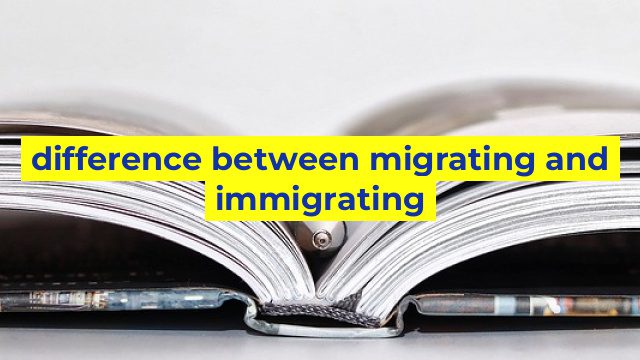What’s the difference between migrating and immigrating?
When it comes to two words that seem interchangeable, migration and immigration, the difference between them is quite significant. Understanding the disparity between the two terms is essential, especially for individuals planning to move from one country to another.
Migrating
Migration means the process of moving from one place to another place, usually within the same country. People migrate to different places for various reasons, such as job opportunities, education, or lifestyle changes. Migration within a country usually doesn’t require government approval, depending on the specific laws and regulations of the area where the person is moving from and to.
For example, someone moving from New York to California will be considered as migrating instead of immigrating.
Immigrating
Immigration, on the other hand, is the process of entering and settling in a foreign country for permanent residency. Immigration involves several legal steps and requirements and requires government approval. Before entering a foreign country, immigrants are required to obtain visas and various other documents, such as a work permit, study permit, or permanent residency.
When someone moves from their home country to another to become a resident of the new country, this is considered as immigration.
The Conclusion
In conclusion, the key difference between migrating and immigrating is simply the destination, where migrating involves moving within a country or region and immigration involves moving from one country to another. Hence, if you are planning to move from your home country to another for permanent residency, you are immigrating, and if you are just moving from one state to another state, you are simply migrating. Understanding the distinction between the two processes is critical as it can affect the legal requirements and processes involved in moving from one place to another.
Table difference between migrating and immigrating
| Migrating | Immigrating |
| Refers to the movement of people or animals from one region or habitat to another, usually for seasonal or environmental reasons | Refers to the act of entering and settling in a country or region that is not one’s own |
| Can be a temporary or permanent move | Generally implies a permanent move |
| Can occur within the same country, such as moving from one state to another | Occurs when moving to a different country or region |
| May involve moving for work or education purposes | Often involves applying for and obtaining legal documents such as a visa or green card |
| May not require significant cultural adjustment | May require significant cultural adjustment, including learning a new language and adapting to new customs |
